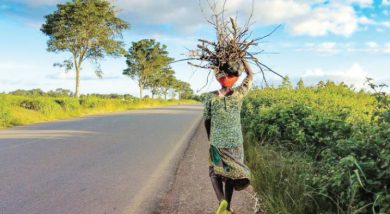A leaf from Neno’s healthcare
The story of Zione from T/A Dambe’s area in Neno typifies the hustles of growing up in the district, known as one of the poorest districts in Malawi.
Aged five, she was born HIV-positive. Her father died before she was born and her mother a month after her birth. Her 75 year-old grandmother brings out the pain: “Her father passed away in 2008 when her mother was pregnant. The mother died in 2009. My major worry was how was I going to feed her with the little I had? I used to peel sugarcane and pound it in a mortar, then let her drink it.”
Hunger has been biting the family hard, as she has had to go into Mozambique, where she can get some cassava to help her grandchild have food as she takes the heavy medication.

Even more, getting anti-retroviral (ARV) drugs for the little one became a big problem as the hospital was very far away. “Neno hospital is situated some 26 kilometres from our home. I used to start off at around four in the morning and get to the hospital around two in the afternoon to get her medication. I would sleep on the verandah and start off around four the next morning,” said the granny.
But today, the smile on her face is there for all to see. Now she doesn’t have to walk that distance, as Partners in Health (PIH) started to bring mobile clinics to her village.
With 73.9 percent of the population living on less than K570 (US$1) a day, Neno is known for its poor road and telecommunications network.
These have posed great challenges to the district’s development, since it was declared a district during the Bakili Muluzi tenure.
In spite of all this, the district, as testifies Zione’s grandmother, has made great strides in ensuring that sustainable and effective health systems are in place.
Seven years ago, Neno had 11 health centres, the biggest of which had three small rooms, four in-patient rooms, and a ten-bed maternity room with two labour beds. The hospital was staffed with one clinical officer, one medical assistant and two nurses—one for the day shift and the other for the night. There was only one ambulance available for approximately 98 000 people living in the mountainous area and at times nurses had to walk for over 15 hours a day just to reach patients.
For most people, especially those living with HIV like Zione, accessing health care was almost impossible.
Fast tracking to the present, Neno now boasts 11 outreach clinics, 11 health centres and two modern and well-equipped hospitals with a combined work force, from the Ministry of Health and PIH, of six doctors, 24 clinicians and 72 nurses. To support this development members of the community have played a great part in ensuring more people are reached. Currently, there are 936 village health workers and 16 amongst them are dedicated to helping people with disabilities.
The district hospital also has a rehabilitation unit which offers specialty care to people with physical challenges.
Thanks to the partnership between the ministry and PIH (known in Chichewa as Abwenzi Pa Za Umoyo, or APZU), Neno’s HIV care programme is becoming successful, with HIV-testing and counselling and Antiretroviral Therapy (ART) available at all the facilities. When the first ART clinic opened in 2006, only five patients were on treatment; now over 6 000 patients are registered in care. The survival rate of the ART cohort is one to marvel over, with 94 percent of the ART cohort alive and on ART after 12 months, compared to 81 percent nationally, according to the 2012 Ministry of Health Survival Analysis.
According to Montfort Ndalama, a member of the community, the PIH/APZU village health worker team provides patient support to ensure treatment adherence and accompany patients to clinics. This approach to health care has also ensured that those living with HIV are not alienated, but rather are accepted and, together with their communities, able to fight the disease.
Reflected Ndalama: “Before this partnership, we used to queue at grave sites to bury our loved ones. Whole families were wiped away by the dreadful epidemic. Now, we sing songs of joy because we are the lucky ones and we are more than thankful.”
However, poverty still plays a great role as the root of most health challenges. Therefore, the PIH/APZU Program on Social and Economic Rights (POSER), economically empowers the most vulnerable people in Neno, regardless of their HIV status, through cash assistance and vocational training in carpentry, tailoring, knitting, farming, and restaurant management to help patients and their families lift themselves out of poverty. The programme also helps children attend school by supporting the costs of school fees, school uniforms, and school supplies and provides safe housing for patients in need.
The innovative journey for PIH/APZU and MOH continues: the district recently opened a state-of-the-art maternity ward at the district hospital with 80 beds, and PIH/APZU is finishing maternal waiting homes at two other health facilities in Lisungwi and Chifunga to ensure pregnant women get help in time as the geography of the district poses a challenge for many women trying to get to the hospital.
Moreover, the district now has its own oxygen plant, which, to their knowledge is the only oxygen plant available to the public in the country. Most recently, the MOH, PIH/APZU and St. Luke’s hospital, proprietors of Matope Health Centre, have collaborated to ensure free health services for 18 000 people in an area where health challenges are now rampant due to the floods earlier this year.
PIH/APZU is now focusing on supporting the MOH’s efforts to decentralise chronic care through integrated initiatives that screen for multiple health conditions like diabetes, cervical cancer, HIV, hypertension and malnutrition at sites most convenient for the patients, hence allowing them to be referred to the nearest health centre in time to receive treatment.
PIH/APZU executive director Dr Luckson Dullie, Neno, which is slowly becoming a model district in the health sector, provides good ground for training, and making new ideas work.
“The district is small enough to try out new ideas and this has helped us think outside the box when conducting most of our work. This approach is what has brought a lot of success in our operations and because of this we have started using Neno as a rotation site for students from the College of Medicine so that these future health care leaders can experience what’s possible in the delivery of quality services,” says Dullie.
As Zione and other people are now smilling, the grins on others in need of health care are refusing to fade as there are still challenges in the district with child malnutrition rates of 55 percent and low coverage of immunisation for children. Like most districts, malaria is also a problem in Neno with high cases of cerebral malaria being reported yearly.
However, as Neno district health officer Dr Lawrence Nazimera believes, the successes are the ones to be celebrated and shared. Through collaboration with the government, PIH/APZU hopes to establish ways in which these success stories can be translated to other parts of the country, thereby making models out of other districts too.
“Neno is a district with some advantages and disadvantages when it comes to health. Advantages in terms of resources from government and partners, disadvantages in terms of too much inequality and poverty. I focus more on the advantages than the rest,” affirms Nazimera.





